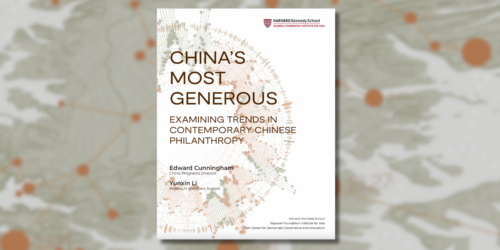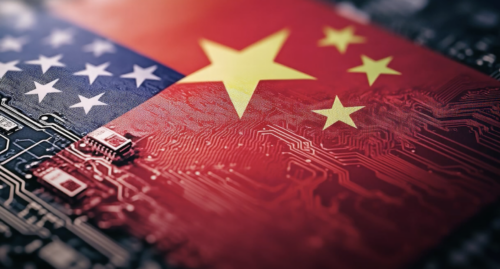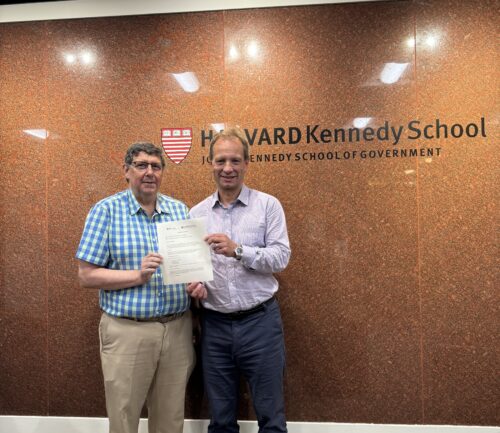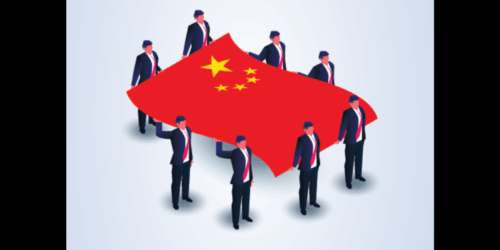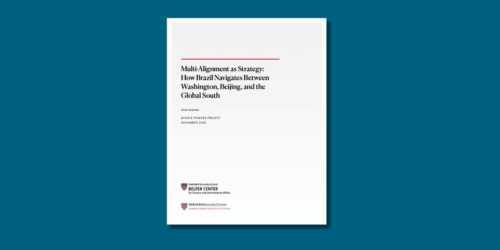With delegates to China’s 20th Party Congress wrapping up their work in Beijing, we sat down with Tony Saich, Daewoo Professor of International Affairs and Director of the Rajawali Foundation Institute of Asia at Harvard Kennedy School to examine how Xi was able to so thoroughly dominate the week’s proceedings. Saich discusses what Xi’s third term as General Secretary portends for the future of China and what potential troubles may be looming on the horizon for a political leader with such an extraordinary grip on power.
Ash: While officials were tight lipped about the Party Congress proceedings before the conclave kicked off in Beijing, most observers predicted that Xi would use the opportunity to further cement his legacy and signal a policy of continuity rather than a radical shift. Has this past week lived up to those expectations?
Tony Saich: If anything, Xi has emerged even more dominant than was expected. Politics and ideology have trumped all else. The extent of his power is extraordinary, and he has broken most of the informal norms that had operated in recent decades. It began with Xi himself being appointed for a third term as General Secretary. It has continued with Xi paying no heed to the notion that those 68 or older should step down, while those 67 or younger should remain. He has surrounded himself with a leadership group that is loyal to him, irrespective of age or area of competence. It is quite amazing.
The congress does four things: approves the report of the General Secretary, approves the report of the Central Commission for Discipline Inspection (CCDI), elects the new Central Committee and members of the CCDI, and revises the Party Constitution. All four show the strengthened power of Xi over China’s political world. The report covered all the key ideas of Xi Jinping such as promoting “common prosperity,” the need for a strong, disciplined, and unified party to rule China, the new development strategy, and the need for security and stability.
The CCDI is important to Xi as it monitors the behavior of party members. Controlling corruption is important to Xi and the Commission will help ensure the strong, disciplined party that he views as crucial for China’s success. It helps promote “self-revolution” within the party.
The Central Committee is packed with Xi supporters and the new Politburo Standing Committee is comprised entirely of those close to Xi Jinping. Those thought to be affiliated with other groups in the party, such as Premier Li Keqiang and Wang Yang, were not reelected to the Central Committee and Hu Chunhua was not reelected to the Standing Committee.
Amendments to the Party Constitution all emphasize the key ideological contributions of Xi Jinping. “Common prosperity” reflects his approach to dealing with the inequalities in China and the attempt to shift to quality of growth rather than speed, and how its benefits are distributed. The “Two establishes” enshrine Xi as the “core leader” with his thought central to guiding policy action. The need for security is stressed as is maintaining a fighting spirit. For the first time, the Constitution includes a mention of Taiwan: “resolutely opposing and deterring separatists seeking ‘Taiwan independence’.”
What were some of the more surprising moments of the congress?
First, as noted, is the complete dominance of Xi with no regard for other groups within the party.
Second, the Congress is always a well-scripted event and thus it was extraordinary to see former General Secretary, Hu Jintao, being escorted from the stage at the concluding session of the Congress. It is hard to say if this was done to humiliate him or whether he was sick. Certainly, he looked disoriented, and the other senior leaders looked embarrassed by the whole thing.
Third, was the absence of any leaks about the new leadership line-up. Usually, it is much clearer. As a result, I do not know of any analyst, including myself, who was able to predict the members of the Standing Committee of the Politburo.
What does the membership shakeup in the Central Committee made after the conclusion of the party congress, specifically the decision not to reappoint Premier Li Keqiang and Wang Yang signal about Xi’s grip on power?
We knew that Xi would appoint a leadership loyal to himself, but such a total dominance was unexpected. It shows that he does not see other groups within the leadership as relevant to his plans or as a threat to his position. The exclusion of Li Keqiang was expected but the fact that Wang Yang did not make the Central Committee either was not. With Hu Chunhua excluded from the Politburo as well, it means that all seven new members have been chosen of the basis of loyalty and closeness to Xi. Those who might have presented alternative views (Li, Wang, and Hu) have been shut out. This has certain consequences.
The members of the Standing Committee have not been chosen on the basis of policy expertise but are bureaucrats who have a close association with Xi. Loyalty has trumped competence. This could be a problem as China will face serious policy challenges post-Congress. How to generate growth in the economy? How to deal with COVID? Can the strict lockdown policy be moderated? How can China resist the increased pressure that the United States is now exerting? These challenges require sound policy expertise rather than ideological dogma.
The nature of the leadership will create the Putin syndrome for China. Essentially, all will depend on the views of one-person and it is unlikely that there is anyone of influence who will be willing to tell Xi that policy is not working or needs to be adjusted. Who will tell the emperor that he has no clothes?
While Xi’s grip on power has never been seriously questioned during his decade long tenure as general secretary, there have always been independent pockets of political power throughout the party. How has Xi succeeded in further centralizing his authority following the congress?
Despite sniping criticisms about the cult of personality and the excessive centralization of power, there has never been any real challenge to Xi’s paramount position. Since coming to power, he has been adept at placing his supporters in key positions throughout the system. He reorganized the military and more recently was able to reorganize the intelligence services. His supporters have headed the Organization Department, which makes all the key appointments at the central and provincial level, and the Propaganda Department, which makes sure that there is a steady stream of eulogies recounting Xi’s brilliance and vision.
These activities facilitated his dominance at the Congress, and he has appointed a leadership of followers, which has surprised observers. This means his policies will roll out uncontested. The enshrining of his key concepts in the Constitution means that moving forward his views on domestic and international development are difficult to resist.
Who are the prominent faces among this new cohort of leaders appointed following the party congress. Who should China watchers be focused on in particular, especially given the lack of an heir apparent to Xi?
The fact that Xi has clearly not indicated a successor means that he intends to remain the dominant figure until 2035 at least, when he will be a similar age to Mao Zedong and Deng Xiaoping when their power ended. This renders the system unstable. Should Xi fall under the proverbial bus, who will replace him? What is the mechanism for succession? The party has never been good at delivering an orderly succession. It could unleash unbridled power struggles within the party. In addition, those from other groups within the party such as the Communist Youth League, now have no formal channels to express their views to the highest level of leadership. Will they be forced to work outside of the formal system? Perhaps Xi feels that his dominance is so strong that he does not need to listen to their views, and they are irrelevant to his view of the future.
Certain appointments are worth watching. First, the appointment of Li Qiang to be the next premier shows the extent to which Xi counts loyalty over competence. It also reveals his confidence and dominance over the system. Li oversaw a chaotic look-down of Shanghai that led to extensive criticism from its citizens and led some to question his capabilities. None of this is relevant to Xi, but it does raise questions about his ability to oversee the economy in difficult times. Further, he has no experience within the State Council system.
Two appointments in the foreign affairs sphere are interesting. Despite his age, Wang Yi (69), the foreign minister, has been promoted to the Politburo rather than being retired. This means that he will take over the foreign affairs portfolio in the Politburo. Also, it would indicate that the “wolf warrior” diplomacy will continue. Qin Gang, the ambassador to the United States, has been appointed to the Central Committee. We need to see if he will remain in post or whether he will be appointed foreign minister. Either way, it is important as it shows that the leadership realize the important role that the relationship with the United States will play in the future. Clearly, Xi wants a loyalist in this position, but one who knows how to speak with the United States, while defending China’s national interest.
The order in which the new Standing Committee members came out indicates the posts that they are likely to fill: Li Qiang as future premier, Zhao Leji as future head of the National People’s Congress, Wang Huning as future head of the Chinese People’s Political Consultative Conference, Cai Qi as first secretary of the General Office of the Central Committee, and Ding Xuexiang as vice-premier.
One interesting further feature is placing the position of premier as number two instead of the Chair of the NPC and placing the standing vice-premier above that of the CCDI in the pecking order. This might suggest the importance that the new leadership will pay to economic questions.
